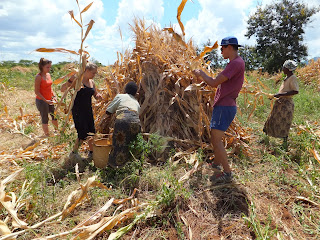Apologies for the delay, at long last I’ve had the
opportunity (and, perhaps more importantly, the inspiration) to write another
update on life here in Malawi. For ‘regular viewers’ out there, this will
probably be my last post whilst on this trip, though whether or not it also
constitutes the last ever remains to be decided.
Nonetheless, it may be the end of the chapter, but it’s not
the end of the book. 3 months have come and gone. Our time as a team in Malawi
is rapidly drawing to a close. I’ve already spoken about legacy, so I don’t
want to dwell on that too much. Yet, I also mentioned previously about the
beginnings of an idea, one that will hopefully translate into reality once I’m
back home – it is this that I want now to discuss.
Education is the backbone of
development in Malawi. Nevertheless, many Malawian children are unable to fully
pursue their education and fulfil their academic potential. The principal
obstacle is cost. Although primary education is free, secondary education
remains subject to tuition fees, which immediately exclude learners whose
families are unable to financially support their studies.
Hardest hit are orphans. Already
victims of the HIV/AIDS epidemic and stigmatised by society, their extended
families struggle to meet even their most basic needs, let alone pay for their schooling.
Even at primary level, their progress lags behind the other pupils; orphans can
represent up to 20% of a school’s intake, but only a third of them will pass
their final exams (as opposed to the 50% pass rate of other learners) and
hardly any of them will be selected for secondary school (let alone be able to
afford it).
These orphans, who have the potential,
but not the opportunity, to attend and succeed at secondary school, are the
ones whom I wish to target. In essence, I seek to set up a funding mechanism
that will enable them to obtain a secondary education and thus break out of
their impoverished circumstances. Such an education significantly enhances
their prospects, opening up the possibility of university and also a diverse
range of career paths; options that would otherwise be unavailable to them. Just
£100 would cover one pupil’s tuition fees for the entirety of their secondary
education.
Now, some of you reading may be
worried that I’m about to make an impassioned plea for your money, akin to
Comic Relief or Band Aid. Not so. I write about this venture simply to share a personal
conviction and to raise awareness of a forgotten plight. If people want to
support this venture then fine, but I do not want to force or guilt trip anyone
into doing so. I merely wish to reiterate a point made months ago, about the
ripple effect: one small act for good can have huge repercussions, far beyond our
wildest dreams. In our families, in our society, in our world - what ripples
will YOU make?
